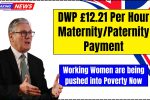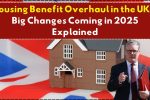
The UK government has confirmed a vital financial boost for struggling households with a one-time £250 payment scheduled for May 2025. This support comes as part of the extended Household Support Fund (HSF), which will now run through March 2026, providing much-needed relief to those most affected by the ongoing financial pressures across the country.
Who Qualifies for the May 2025 Cost of Living Payment?
The £250 payment targets those facing the greatest economic challenges during these difficult times. Several groups may be eligible for this financial assistance:
Benefit Recipients
If you’re currently receiving means-tested benefits such as Universal Credit, Income Support, Pension Credit, Jobseeker’s Allowance (JSA), Employment and Support Allowance (ESA), or Tax Credits, you’ll likely receive the payment automatically without having to take any action.
Pensioners
Older adults already receiving Pension Credit will automatically qualify for the payment. If you’re at pension age but haven’t yet applied for Pension Credit, you’re strongly encouraged to do so, as this could unlock access to this payment along with other financial support measures.
People with Disabilities
Those claiming disability benefits, including Personal Independence Payment (PIP), Disability Living Allowance (DLA), or Attendance Allowance, may also be eligible. Be aware that specific requirements might vary depending on your local authority’s policies, and you might need to provide additional documentation.
Low-Income Households Not Receiving Benefits
Even if you’re not currently on formal benefits, households with low incomes and savings under £2,000 can apply for the payment. Local councils will evaluate factors such as rent, utilities, number of dependents, and total household income when determining eligibility.
How Will the £250 Cost of Living Payment Be Distributed?
The distribution method depends on your circumstances:
| Distribution Method | Applies To | Action Required |
|---|---|---|
| Automatic Payment | Benefit recipients, pensioners on credit | No action needed; payment via direct deposit or cheque |
| Manual Application | Low-income households not on benefits | Apply through your local council portal |
Application Process for Non-Benefit Households
If you won’t be receiving an automatic payment, follow these steps to apply:
- Assess Your Financial Situation: Gather comprehensive information about your income, expenses, and savings.
- Locate Your Council: Use the council finder tool available on gov.uk to identify your local authority.
- Visit the HSF Section: Navigate to the Household Support Fund area of your council’s official website.
- Prepare Required Documents: You’ll need to provide identification, recent bank statements, utility bills, rental agreements, and payslips.
- Complete the Application: Fill out the online form and upload all necessary documentation.
- Wait for Processing: Be prepared for a processing period of approximately 2 to 6 weeks.
Understanding the Household Support Fund
The Household Support Fund was initially launched in 2021 during the COVID-19 pandemic to address immediate crises related to rising energy costs and economic instability. With its extension to March 2026, the fund has evolved into a broader support mechanism for financially strained households throughout the UK.
While the central government provides the funding, local councils maintain autonomy in establishing eligibility criteria. This approach allows for more tailored responses based on specific local economic conditions and needs.
Additional Support Available in 2025
Beyond the £250 payment in May 2025, several other support programs remain active to provide additional assistance:
- Winter Fuel Payment: Between £250 and £600 to help pensioners manage heating costs during colder months.
- Cold Weather Payment: £25 per week for eligible households during periods of freezing weather.
- Warm Home Discount: A £140 reduction on electricity bills for qualifying households.
- Council Tax Reduction: Reduced tax rates for low-income households based on means testing.
These programs work together to create a more comprehensive safety net for those experiencing financial difficulties.
Why This Payment Matters in Today’s Economy
Despite some improvement in inflation rates compared to the peak of the crisis in 2023-2024, essential costs like rent, groceries, and utilities remain high in May 2025. Many households continue to struggle with recovery from prolonged financial pressure.
The UK £250 Cost of Living Payment in May 2025: How to Check Your Eligibility represents an ongoing commitment from the government to support vulnerable individuals and families during challenging economic times. The council-based distribution system ensures faster response times and policies that better reflect local needs, although qualification criteria may vary between different areas.
Avoiding Scams Related to Cost-of-Living Payments
With any government financial support comes the risk of scams. Be aware that:
- Official communications about the payment will never ask for your bank details via email or text
- The government will not charge a fee to process your payment
- All legitimate applications must be made through official council websites or government portals
- If in doubt, contact your local council directly using contact information from their official website
Taking Action: Next Steps
If you believe you may be eligible for this payment, don’t delay in checking your status or beginning the application process. For those receiving qualifying benefits, monitor your bank account in May for the automatic payment. For others, contact your local council as soon as possible to determine your eligibility and start the application process.
The £250 payment represents significant help for households battling rising costs, but timely action is essential to secure this support. With the HSF extended until March 2026 and additional aid programs in place, there is a broader safety net available, but awareness and prompt action remain key to accessing these vital resources.
Remember that local councils have different implementation timelines and specific criteria, so checking with your particular authority is the best way to confirm your eligibility and understand exactly what steps you need to take.

Katherine Johnson is a passionate writer with a keen interest in storytelling, content creation, and creative expression. She enjoys exploring diverse topics and crafting engaging narratives that captivate readers.



